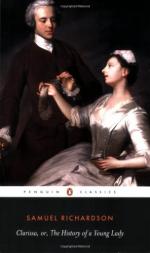In short, Belford, thou wert an excellent starter and setter. The old women were not afraid for their daughters, when they saw such a face as thine. But, when I came, whip was the key turned upon the girls. And yet all signified nothing; for love, upon occasion, will draw an elephant through a key-hole. But for thy heart, Belford, who ever doubted the wickedness of that?
Nor even in this affair, that sticks most upon me, which my conscience makes such a handle of against me, art thou so innocent as thou fanciest thyself. Thou wilt stare at this: but it is true; and I will convince thee of it in an instant.
Thou sayest, thou wouldst have saved the lady from the ruin she met with. Thou art a pretty fellow for this: For how wouldst thou have saved her? What methods didst thou take to save her?
Thou knewest my designs all along. Hadst thou a mind to make thyself a good title to the merit to which thou now pretendest to lay claim, thou shouldest, like a true knight-errant, have sought to set the lady free from the enchanted castle. Thou shouldst have apprized her of her danger; have stolen in, when the giant was out of the way; or, hadst thou had the true spirit of chivalry upon thee, and nothing else would have done, have killed the giant; and then something wouldst thou have had to brag of.
’Oh! but the giant was my friend: he reposed a confidence in me: and I should have betrayed my friend, and his confidence!’ This thou wouldst have pleaded, no doubt. But try this plea upon thy present principles, and thou wilt see what a caitiff thou wert to let it have weight with thee, upon an occasion where a breach of confidence is more excusable than to keep the secret. Did not the lady herself once putt his very point home upon me? And didst thou not, on that occasion, heavily blame thyself?*
* See Vol. VII. Letter XXI.
Thou canst not pretend, and I know thou wilt not, that thou wert afraid of thy life by taking such a measure: for a braver fellow lives not, nor a more fearless, than Jack Belford. I remember several instances, and thou canst not forget them, where thou hast ventured thy bones, thy neck, thy life, against numbers, in a cause of roguery; and hadst thou had a spark of that virtue, which now thou art willing to flatter thyself thou hast, thou wouldst surely have run a risk to save an innocence, and a virtue, that it became every man to protect and espouse. This is the truth of the case, greatly as it makes against myself. But I hate a hypocrite from my soul.
I believe I should have killed thee at the time, if I could, hadst thou betrayed me thus. But I am sure now, that I would have thanked thee for it, with all my heart; and thought thee more a father, and a friend, than my real father, and my best friend—and it was natural for thee to think, with so exalted a merit as this lady had, that this would have been the case, when consideration took place of passion; or, rather, when the d——d fondness for intrigue ceased, which never was my pride so much, as it is now, upon reflection, my curse.




